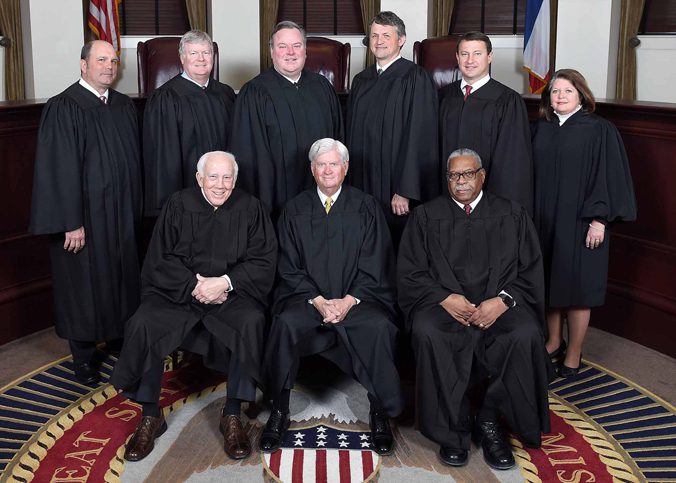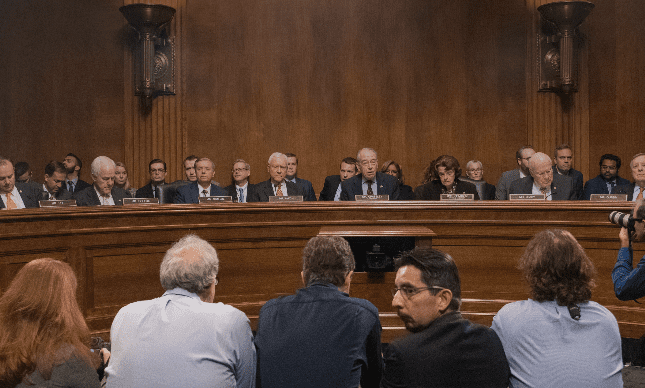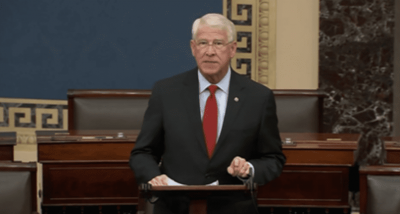
Mississippi Supreme Court Justices.
With a Special Judge now appointed, the case over the state’s trigger law will be heard. Here’s how it could play out.
On Monday, Mississippi’s lone abortion clinic in partnership with activists at the Mississippi Center for Justice filed a lawsuit seeking an injunction against the state’s trigger law that would make abortion illegal except in the case of a formal charge of rape or for the preservation of the mother’s life.
READ MORE: Clinic, activists file last minute lawsuit to invalidate Mississippi trigger law
That trigger law is set to go into effect July 7th after the U.S. Supreme Court overturned the 50-year-old Roe v. Wade case that made abortion an industry across America, sending the regulatory authority of the practice back to the states where elected legislatures can decide what parameters to set around the procedure.
Mississippi Attorney General Lynn Fitch has certified and published the Court’s ruling and put the Jackson-based abortion clinic on notice as was required by the trigger law.
The most recent lawsuit brought by the abortion clinic, legally known as Jackson Women’s Health Organization, claims the trigger law violates the state constitutional right to abortion as protected under the Mississippi Constitution. They cite a 1998 case Pro-Choice Mississippi v. Fordice that was decided by the Mississippi Supreme Court that stated at the time “[n]o right is held more sacred… than the right of every individual to the possession and control of his own person,” and “no aspect[] of life is more personal and private than those having to do with one’s [own] reproductive system.” The ruling went on to state that “the state constitutional right to privacy includes an implied right to choose whether or not to have an abortion.”
The case was filed in Hinds County Chancery Court and was initially assigned to Judge Crystal Wise Martin. However, all judges in Hinds County Chancery Court system for the Fifth District recused themselves, prompting the Mississippi Supreme Court to appoint a special judge to hear the case.
On Thursday, Chief Justice Mike Randolph announced that Judge Debbra K. Halford of the Fourth District had been appointed to preside and conduct proceedings in this matter. She was appointed to the Court by then-Governor Haley Barbour in 2005 and has been re-elected each cycle since.
How This May Play Out in the Courts
The federal and state constitutions are separate, meaning the fact that the U.S. Constitution no longer protects a right to abortion as decided by the U.S. Supreme Court does not mean the Mississippi constitution cannot speak to that issue. The state is a separate sovereign entity and can recognize different rights than the federal government, which by and large is what the majority of Justices said last week when they returned the regulatory authority for abortion back to states.
The Fordice decision, on its face, the abortion advocates reference in their latest lawsuit, remains a binding precedent until it is overturned. As such, the Mississippi ban on abortion by way of the trigger law is likely to be prohibited from being implemented by the assigned Judge and will then through appeal most assuredly be before the Mississippi Supreme Court.
The Fordice decision acknowledged there is nothing in the Mississippi constitution explicitly recognizing such a right to abortion but rather extended a right to privacy, which also is not explicitly mentioned in the Mississippi constitution, to include the right to obtain an abortion. The state Justices as the time relied heavily on Roe for its treatment of abortion, specifically the way it had been treated under criminal law.
The Fordice decision essentially used the same sort of questionable logic in Casey and Roe, which has now been overturned by the U.S. Supreme Court.
The Mississippi Supreme Court is now composed of a significantly different group of Justices, and they might well overrule the Fordice decision just as the federal Justices have done given the impetus to return the decision making of such matters to the elected representatives rather than have a court act as a regulatory authority. The Mississippi Legislature through a series of actions has spoken fairly clearly on the issue.
Further, as a reminder, these Justices are not lifetime appointees; they will stand for re-election and answer to the voters.
For now, whether Special Judge Halford sides with the abortion clinic’s argument on precedent, enforcing the Fordice decision, is an open question. Only the Mississippi Supreme Court can overturn a decision of the Mississippi Supreme Court, which is where this case will then be determined from all indications.
Could Legislators Act?
Some states will undoubtedly seek to create state constitutional abortion guarantees while other more conservative states may seek to place abortion restrictions into their own constitutions.
The Mississippi Constitution could be amended to protect life and set parameters on abortion in this state, but that would require the Legislature putting such a question before voters in a statewide election.

To do that, a well written constitutional amendment and a statewide campaign effort would be necessary for the amendment to pass. The earliest this could logically be possible would be on the statewide ballot in 2023 when voters will elect state and county officials, meaning lawmakers would need to pass that ballot referendum during the 2023 session to be place on the November 2023 ballot.
The referendum would need to explicitly remove the right to abortion or ban abortion as a matter of constitutional law while setting specific parameters around when the procedure could be used. If written well, and not overly aggressive where it created legitimate fears among voters, it would stand a high likelihood of passing overwhelmingly given the current tenor among the electorate in Mississippi.











